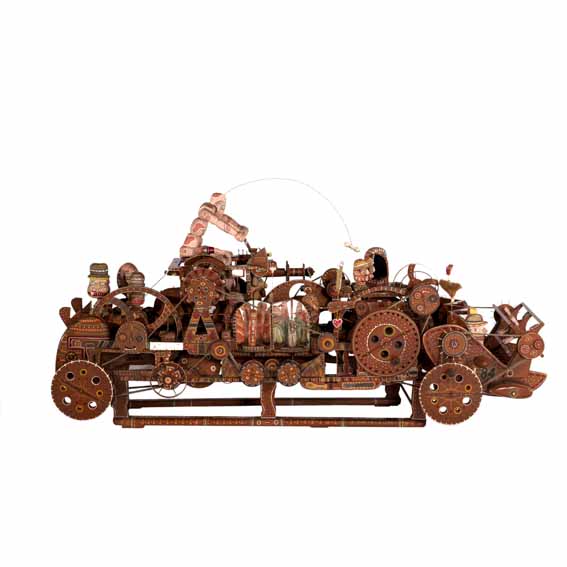FR
Petit agriculteur, Edmond Morel était un homme très sociable et adorait les enfants. In 1967, il prend sa retraite et se met à fabriquer une réplique du camp où il était prisonnier en Autriche durant la Seconde Guerre mondiale. Petit à petit, il abandonnera le réalisme pour des constructions plus imaginatives et délirantes. Les matériaux de ses constructions sont trouvés dans son environnement proche : cartes à jouer, allumettes, boîtes de médicaments, morceaux de papier peint… Ses outils sont simples. Avec un couteau, une règle, un stylo bille et de la colle il édifie ses châteaux et immeubles de cartes. Les objets présentés sont entrés à la suite d’un don de son petit fils, René Delcourt, pour que l’oeuvre de son grand-père soit sauvegardée et admirée. L’oeuvre d’Edmond Morel a été accueillie dans la collection art hors-les-normes par Caroline Bourbonnais en 1996. Ses constructions ont été choisies par Antoine Gentil pour son exposition au Consulat, lieu éphémère, festif et itinérant à Paris, lors de l’été 2018.
EN
A small farmer, Edmond Morel was a very sociable man and loved children. In 1967, he retired and started to build a replica of the camp where he was a prisoner in Austria during the Second World War. Gradually, he abandoned realism for more imaginative and delirious constructions. The materials for his constructions are found in his immediate environment: playing cards, matches, medicine boxes, pieces of wallpaper… His tools are simple. With a knife, a ruler, a ballpoint pen and glue he builds his castles and buildings of cards. The objects presented here were entered following a donation from his grandson, René Delcourt, so that his grandfather’s work could be preserved and admired. Edmond Morel’s work was welcomed into the Art hors-les-normes collection by Caroline Bourbonnais in 1996. His constructions were chosen by Antoine Gentil for his exhibition at the Consulate, an ephemeral, festive and itinerant place in Paris, during summer 2018.















